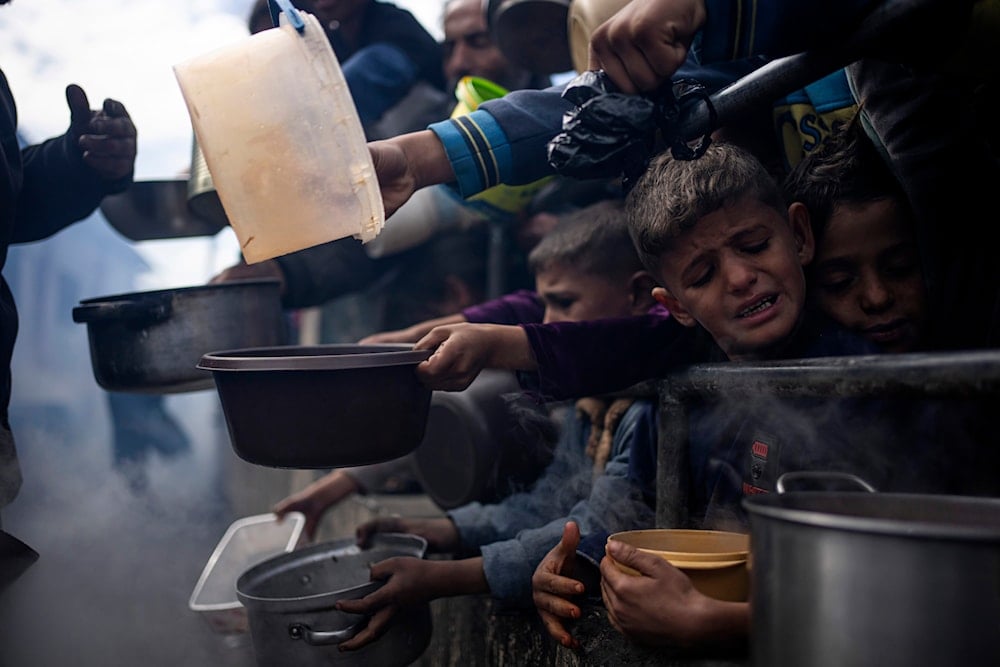Gaza’s lifeline outsourced: Foreign contractors replace aid agencies
A new Gaza aid system devised by Israeli insiders and executed by former CIA and US military figures threatens to displace civilians and cut off UN channels, with little transparency or oversight.
-

Palestinians line up for a meal in Rafah, Gaza Strip, Friday, Feb. 16, 2024, amid Israeli blockade and relentless bombing. (AP)
"Israel" is launching a new aid distribution network in Gaza that bypasses the United Nations and established humanitarian organizations, instead placing food assistance under the control of American-led private contractors with intelligence and military backgrounds, The New York Times has revealed. Critics warn the plan could exacerbate Palestinian suffering and facilitate forced displacement.
The system is being managed by Safe Reach Solutions (SRS), a firm headed by Philip F. Reilly, a former senior CIA officer with a controversial past, including roles in Nicaragua and Afghanistan. Fundraising is being led by Jake Wood, a former US Marine who now runs the Gaza Humanitarian Foundation (GHF), a nonprofit whose structure and finances have raised questions among aid experts.
Though the US ambassador to "Israel", Mike Huckabee, publicly insisted in May that the plan was “not an Israeli initiative,” multiple Israeli officials and sources familiar with the project confirmed it was conceived by Israeli figures early in the war.
The initiative, as per the NYT piece, dates back to private meetings held in late 2023, in the wake of October 7. Israeli military officers, political insiders, and business elites formed an informal network, later calling themselves the Mikveh Yisrael Forum, to develop a "post-war vision for Gaza."
Origin of the plan: Israeli-led meetings and a shadow forum
Key figures include Yotam HaCohen, now an advisor to Prime Minister Benjamin Netanyahu’s military staff, tech investor Liran Tancman, and venture capitalist Michael Eisenberg. The trio proposed a radical shift: replacing the UN-led aid model with contractor-run logistics networks to distribute food strictly from Israeli-occupied areas, bypassing northern Gaza and reducing what they claimed was diversion of supplies to Hamas.
In a military journal published in July 2024, HaCohen advocated for “non-state contractor companies” and direct Israeli engagement with Palestinians in Gaza. The stated goal was long-term strategic disruption of Hamas’s support base, but UN officials warned it could amount to coerced displacement.
By late 2024, Israeli officials were working closely with Reilly, then at the Virginia-based consultancy Orbis, which had authored a feasibility study on private aid delivery. Two entities, SRS and GHF, were registered in the US in November, and SRS began trial operations during a January ceasefire.
US operatives and contractors step in
According to Wood, SRS has now assumed a leading role in securing four distribution points in southern Gaza, which currently serve as the only entry zones for aid. “The reality is, any food that is getting into Gaza today is more food than got into Gaza yesterday,” Wood told reporters. He claimed that there is no Israeli control over the foundation’s work.
Still, "Israel" claims it is implementing the model under the pretext of preventing aid from reaching Hamas and ensuring stricter oversight at Israeli-occupied checkpoints.
Despite claims of independence, GHF’s structure is riddled with overlapping roles and anonymous donors. Both SRS and GHF were registered by the same US lawyer, James H. Cundiff, and until recently, shared a spokesperson. Wood admitted early funding came from unnamed non-Israeli businessmen, later claiming that a Western European country had contributed over $100 million, a claim that remains unverified, according to the New York Times.
GHF says it supports nearly one million Gazans and employs over 1,000 armed guards, but no independent accounting has been published. The foundation has acknowledged there are at least two similarly named entities, one in the US, one in Switzerland, further complicating verification.
Meanwhile, UN agencies have voiced serious concerns. By cutting them out of the process and limiting aid to the south, the plan risks forcing Palestinians to cross war zones in search of food, effectively aiding "Israel's" push to depopulate northern Gaza.
UN rejects US-backed Gaza aid plan over neutrality concerns
The United Nations announced on May 15 that it would not participate in the US-backed humanitarian operation in Gaza, citing concerns over the plan’s failure to meet core humanitarian principles of impartiality, neutrality, and independence.
"This particular distribution plan does not accord with our basic principles," said Deputy UN Spokesperson Farhan Haq during a press briefing. "We will not be participating in this."
In a related development, Gaza’s media office warned on Saturday of mass starvation and medical collapse under “Israel’s” 84-day siege, calling it a war crime, with over 300 miscarriages and 300 deaths linked to the aid blockade.
In a statement, the office said the blockade has been compounded by continuous, deliberate airstrikes and killings that amount to an ongoing genocide. “Israel’s” promotion of what it called a “deceptive narrative” about allowing aid entry was strongly refuted by Gaza authorities, who revealed that fewer than 100 aid trucks have entered, less than 1% of the basic needs of the population.
According to the statement, Gaza should have received at least 46,200 trucks carrying food, medicine, and fuel since the start of the siege to meet the population’s minimum requirements. Instead, the few trucks permitted entry have faced additional challenges, including severe restrictions on their movement, looting by armed groups allegedly operating with the occupation’s tacit approval, and direct targeting of teams working to secure the aid.
Concurrently, the Israeli genocide continues unabated, killing at least 53,000 Palestinians, the majority of them women and children, in yet another wave of indiscriminate slaughter. Among the latest horrors was a massacre early Saturday morning that killed nine children from a single family.
Read more: US-backed Gaza aid plan relies on mercenaries, sparks outcry: FT

 6 Min Read
6 Min Read









